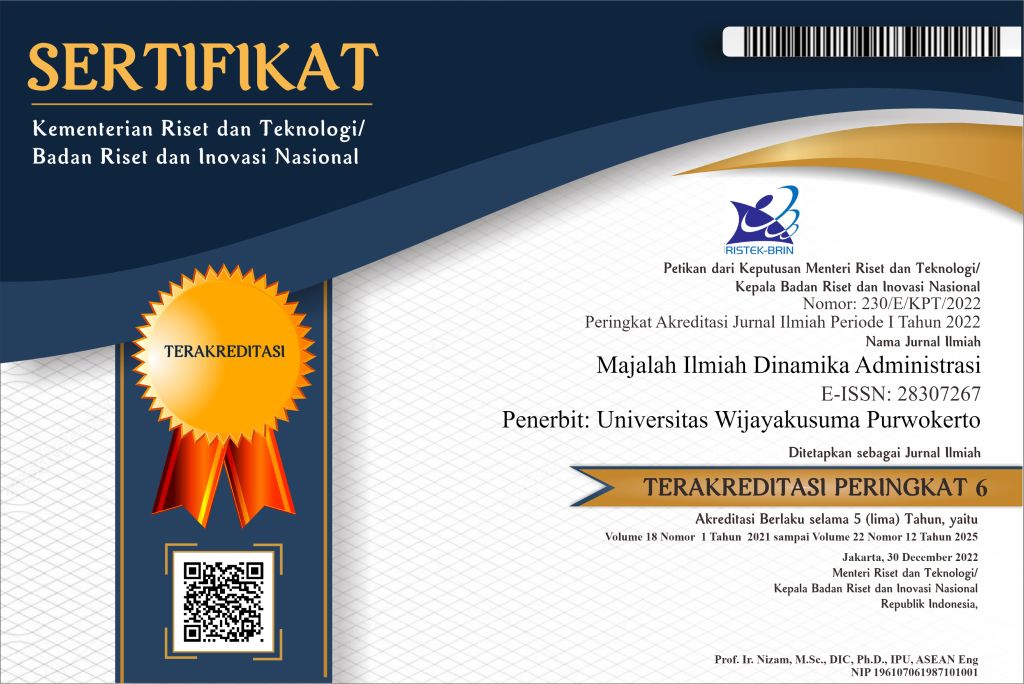THE EFFECTIVENESS OF INTERNAL AUDIT AS A FRAUD PREVENTION EFFORT
Abstract
Full Text:
PDFReferences
AAIPI. (2013). Standar Audit Intern Pemerintah Indonesia. Retrieved from https://inspektorat.gorontaloprov.go.id/wp-content/uploads/2017/10/Standar-Audit-Intern-Pemerintah-Indonesia.pdf
Abdelrahim, A., & Al-Malkawi, H. A. N. (2022). The Influential Factors Of Internal Audit Effectiveness: A Conceptual Model. International Journal of Financial Studies, 10(3), 71.
Akmal. (2007). Pemeriksaan Intern (Internal Audit), Cetakan ke-2. Jakarta: PT Indeks, kelompok Gramedia.
Arief, R. (2016). Peran Audit Internal atas Kualitas Pemeriksaan Laporan Keuangan yang dilakukan oleh Audit Eksternal pada Sebuah Perusahaan. Jurnal Ekonomi Volume 7 Nomor 1, 74-81.
Bangun, A. F. (2014). Pengaruh Umpan Balik dan Insentif terhadap Pemberdayaan Auditor Internal Pemerintah serta Implikasinya Terhadap Motivasi dan Kinerja. Diponegoro Journal of Accounting. Volume 3, Nomor 2, 1-13.
BPK. (2020). Laporan Tahunan BPK 2019. Retrieved from bpk.go.id: https://www.bpk.go.id/assets/files/annual_report/2020/annual__2020_1606272428.pdf
BPKP. (2008). Fraud Auditing. Edisi Kelima. Bogor: Pusdiklat BPKP.
Dewi, N., Azam, S., & Yusoff, S. (2019). Factors Influencing the Information Quality of Local Government Financial Statement and Financial Accountability. Management Science Letters, 9(9), 1373–1384.
Efendy, M. T. (2010). Pengaruh Kompetensi, Independensi, dan Motivasi terhadap Kualitas Audit Aparat Inspektorat Dalam Pengawasan Keuangan Daerah (Studi Empiris pada Pemerintah Kota Gorontalo. Universitas Diponegoro.
Fatmawati, D., Ariffin, N. M., Abidin, N. H. Z., & Osman, A. Z. (2020). Shariah Governance In Islamic Banks: Practices, Practitioners And Praxis. Global Finance Journal, 100555. https://doi.org/https://doi.org/10.1016/J.GFJ.2020.100555
Ghozali, S. A. (2020). Pengaruh Efektifitas Auditor Internal terhadap Pendeteksian dan Pencegahan Fraud. Universitas Diponegoro.
Huong, T. T. (2018). Factors Affecting the Effectiveness of Internal Audit in the Companie: Case Study in Vietnam. The International Conference on Business Management, 1-12.
IkbaL, M., Irwansyah, I., Paminto, A., Ulfah, Y., & Darma, D. C. (2020). Financial Intelligence: Financial Statement Fraud In Indonesia. Journal of Intelligence Studies in Business, 10(3).
Iszardani, C. G., & Hardiningsih, P. (2021). The Effect of Regional Income, Leverage, Regional Property on Internet Financial Reporting Disclosure. Jurnal Analisis Bisnis Ekonomi, 19(1), 30–47.
Mardiasmo. (2017). Perpajakan. Yogyakarta: Andi.
Mohammed, M. A., Al-Abedi, T. K., Flayyih, H. H., & Mohaisen, H. A. (2021). Internal Control Frameworks and Its Relation with Governance and Risk Management: An Analytical Study. Estudios de Economía Aplicada, 39(11), 18.
Novianto, R. A., Sari, W. K., Nugroho, I., Anjora, F. B. P. Y., Zaidan, R., & Veronica, A. C. (2021). The Effect Of Internal Audit On Fraud Prevention (Case Study On Pt. X). Review of International Geographical Education, 11(3), 1643–1652.
Sawyer, B. D. (2006). Sawyer’s Internal Auditing (buku 3). Jakarta: Salemba Empat.
Sutaryo. (2018). Determinan Efektivitas Audit Internal di Inspektorat Provinsi Jawa Timur. Jurnal Ilmiah Akutansi dan Bisnis, Vol. 13, No. 1, 1-10.
Tafsil, A. (2012). Tujuan dan Manfaat Tindak Lanjut Rekomendasi Audit. Retrieved from https://www.coursehero.com/file/p2pp0b1/247-Tujuan-dan-Manfaat-Tindak-Lanjut-Rekomendasi-Audit-Tindak-lanjut/
Tuding, D. S. (2016). Kapasitas Aparat Inspektorat Dalam Pengawasan Keuangan Daerah Kabupaten Sidoarjo (Kajian Terhadap Kompetensi Aparat Inspektorat Di Kabupaten Sidoarjo). Jurnal Ilmiah Administrasi Publik (JIAP), 2(1), 11–18. https://doi.org/https://doi.org/10.21776/ub.jiap.2016.002.01.2
Tugiman, H. (1997). Standar Profesional Auditor Internal. Jilid 5. Yogyakarta: Kanisius.
Tunggal, A. W. (2010). Teori dan Praktek Auditing. Jakarta: Harvarindo.
Wahyuni, R. (2020). Peran Audit Internal dalam Mengatasi Fraud pada Pemerintah Kota Makassar (Studi Kasus Kantor Balaikota Makassar). Universitas Muhammadiyah Makassar, 1-74.
DOI: https://doi.org/10.56681/da.v21i1.155
Article Metrics
Abstract view : 60 timesPDF - 61 times
Refbacks
- There are currently no refbacks.
Majalah Ilmiah Dinamika Administrasi (MIDA) Fakultas Ilmu Sosial dan Politik Universitas Wijayakusuma Purwokerto








